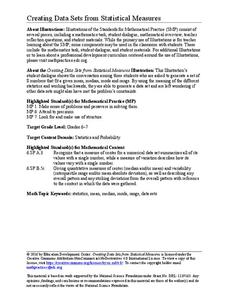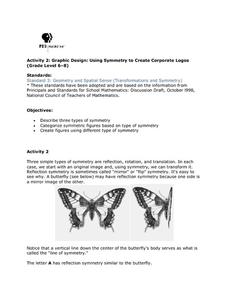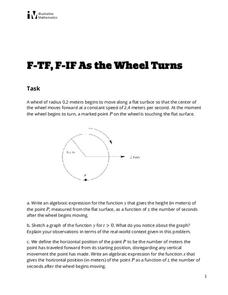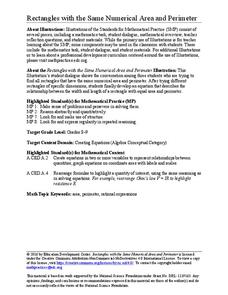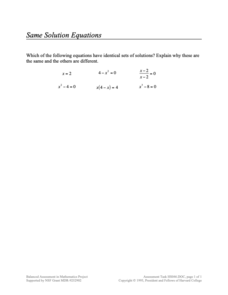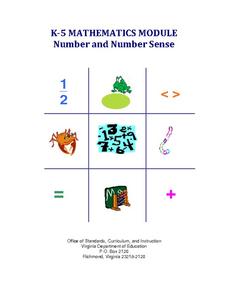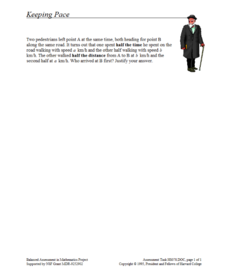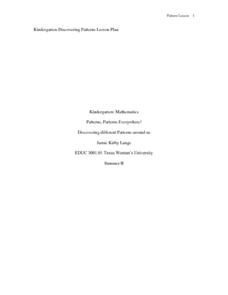Education Development Center
Making Sense of Unusual Results
Collaboration is the key for this equation-solving lesson. Learners solve a multi-step linear equation that requires using the distributive property. Within collaborative groups, scholars discuss multiple methods and troubleshoot mistakes.
Education Development Center
Creating Data Sets from Statistical Measures
Explore the measures of central tendency through a challenging task. Given values for the mean, median, mode, and range, collaborative groups create a set of data that would produce those values. They then critique other answers and...
Education Development Center
Integer Combinations—Postage Stamps Problem (MS Version)
Number patterns can seem mysterious. Help your learners unravel these mysteries as they complete an intriguing task. Through examination, collaborative groups determine that they are able to produce all integers above a certain...
Illustrative Mathematics
Baking Cookies
You can never have enough cookies, but do you have enough ingredients? This activity allows your bakers to discover how many batches of cookies they can make with the ingredients provided. Also useable as an independent assignment, your...
Illustrative Mathematics
Eight Circles
We are used to finding the area of a circle by plugging the radius into an equation. Here, learners are required to go further to find multiple areas and calculate the difference. They must detect a pattern in order to figure out the...
Illustrative Mathematics
Drinking Juice, Variation 3
It is up to the learner to find the amount of juice originally in a bottle, knowing what fraction of the juice is left, and the amount that has been consumed. The accompanying commentary provides a useful and detailed description of...
Illustrative Mathematics
Drinking Juice, Variation 2
An excellent activity using word problems where pupils interpret and compute quotients of fractions. The commentary includes using a fraction bar model and equations to represent the problem. In this variation of the resource, the...
Rational Number Project
Initial Fraction Ideas Lesson 18: Overview
Develop young mathematicians' ability to compare fractions with investigation into the number 1/2. After brainstorming a list of fractions equivalent to 1/2, children identify a pattern in the numerators and...
PBS
Using Symmetry to Create Corporate Logos
Young mathematicians investigate the use of symmetry in graphic design. After first learning about reflection, translational, and rotational symmetry, children use this new knowledge to identify symmetry in letters of the...
Diablo Valley College
The Language of Sets and Set Notation
The basics of number theory and set notation are explained in a highly approachable way in a self-contained lesson and worksheet. Introducing the vocabulary and concepts from ground zero and building to more complex ideas of subsets...
Mathed Up!
Negative Numbers
Eight independent worksheet pages challenge scholars to solve 12 problems that focus on negative numbers in the context of temperature in degrees of celsius.
Shmoop
Functions Worksheet 5
To the point and deeper thinking are both types of questions included in the worksheet. Begin the practice of solving quadratics and then finish with five questions asking quadratic and exponential application problems.
Balanced Assessment
The Contest
Good advertisers can make mathematics seem irrelevant. Teach your classes to use math to see through these tactics and make good decisions. The posed task has pupils analyze sweepstakes statistics to determine and compare the cost of...
Illustrative Mathematics
As the Wheel Turns
Determine the location of a point on a moving wheel. The task challenges groups to determine the horizontal and vertical locations of a point on the edge of wheel that is moving. Teams first determine a function that will model the...
Education Development Center
Rectangles with the Same Numerical Area and Perimeter
Is it possible for a rectangle to have the same area and perimeter? If you disregard units, it happens! In a challenging task, groups work to determine the rectangles that meet these criterion. The hope is that learners will naturally...
Concord Consortium
Strings and Areas
You'd be surprised what you can do with a string! The constraint is the length of string, and the task is to maximize area. Given a series of composite shapes, learners must create a formula for the maximum area for a specified...
Concord Consortium
Same Solution Equations
Group equations by their solutions. Given six different equations, pupils determine which have the same solutions. Scholars explain why some are the same and some are different.
Math Sphere
Co-Ordinates
Challenge young mathematicians' understanding of the coordinate plane with this series of skills practice worksheets. Offering 10 different exercises that involve identifying ordered pairs,...
Curated OER
K-5 Mathematics Module: Number and Number Sense
Reinforce number sense with a collection of math lessons for kindergarteners through fifth graders. Young mathematicians take part in hands-on activities, learning games, and complete skills-based worksheets to enhance proficiency...
Chicago Teachers Union Quest Center
Factored Form of a Quadratic Function
Build upon linear functions to learn about quadratics. The instructional activity introduces the concept of zeros for quadratic functions and makes the connection to the linear factors of the function. It presents quadratics in both...
Math Wire
Gingerbread Man Bake Sale
Gingerbread cookies aren't just a sweet treat! Scholars identity the amount of combinations a baker can make in his gingerbread cookies using limited quantities of decorating ingredients.
Concord Consortium
A Monosignic Function
Complex fractions and trigonometric expressions combine to create a challenging task ... as if they aren't challenging enough on their own! The task challenges individuals to consider the range of possible values when substituting in the...
Concord Consortium
Keeping Pace
What came first, pedestrian one or pedestrian two? Scholars consider a problem scenario in which two people walk at different rates at different times. They must decide who reaches a checkpoint first. Their answers are likely to surprise...
Texas Woman’s University
Patterns, Patterns Everywhere!
Not only is pattern recognition an essential skill for young children to develop, it's also a lot of fun to teach! Over the course of this instructional activity, class members participate in shared readings, perform small...



